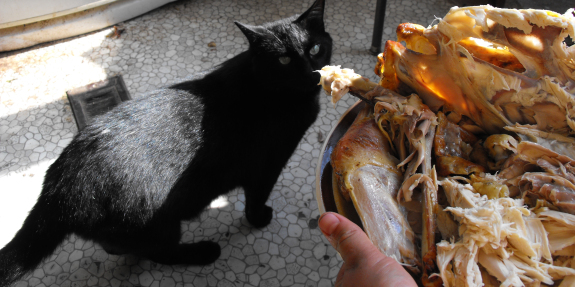
The Huckleberry seal of approval

Although I'm a vegetable
conneisseur, I don't have enough experience to tell the difference
between mediocre meat and awesome meat. This is where Huckleberry
comes in handy.
When I take a piece of
meat out of the supermarket wrapper, Huckleberry naps on the
couch. I can even open a can of tuna, and our spoiled cat will
barely twitch his nose. But when I bring in freshly slaughtered
chickens, he comes running to the kitchen where he meows (in vain) for
a treat.
After its two
day grace period, I
roasted up one of Tuesday's chickens yesterday and Huckleberry was
suddenly ready to help out with anything, no, really, anything. Meow! (Yes, this time I did
give him a tidbit of meat to nibble on.)
To my untrained taste
buds, the 16 week old Dark Cornish roosters are less flavorful
than the 12 week old roosters, falling on the taste gradient somewhere
between a storebought, organic, uncooked chicken and a storebought
rotisserie chicken. But to Huckleberry's nose (and mouth), our
homegrown chickens are ten times better than either. I suspect
Huckleberry is sniffing out the superior nutrition, which makes me even
more inclined to keep experimenting with a good way to raise our own
meat.
Want more in-depth information? Browse through our books.
Or explore more posts by date or by subject.
About us: Anna Hess and Mark Hamilton spent over a decade living self-sufficiently in the mountains of Virginia before moving north to start over from scratch in the foothills of Ohio. They've experimented with permaculture, no-till gardening, trailersteading, home-based microbusinesses and much more, writing about their adventures in both blogs and books.
Want to be notified when new comments are posted on this page? Click on the RSS button after you add a comment to subscribe to the comment feed, or simply check the box beside "email replies to me" while writing your comment.

Anna- do you brine your chickens before roasting them? Those grocery roasted chickens have all sorts of flavorings added to them, including a fair portion of salt. Soaking them for an hour or so and them letting them dry (uncovered) in the fridge helps them retain internal moisture while the salt also heightens flavor.I do this whether it's a $2 chicken or a $26 chicken and it always makes a huge difference.
I believe you can brine a batch in salted ice water inside a cooler and then freeze them. Cooks Illustrated online will give you the "ultimate" proportions but I just wing it.